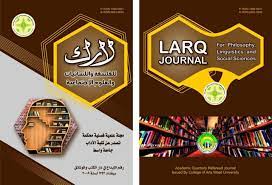Abstract
It has long been said that semantic fields often mirror rhymes and verses where a poet can express intentions, uncover emotions, and bring about inspiration. To this end, poets struggle to combine words and collocations that are ultimately aimed to create a unique poetic text. This paper explores how poets manipulate words and collocations in selected poems by Abu Firas Al-Hamdani, ca. 932-968 A.D., an Arab Muslim poet widely known for his battle-related poems and works. Drawing on the semantic field theory as a model, this paper aims at unfolding how Al-Hamdani used his poems to suggest his inner emotions at home and while in captivity. In the poems under study, al-Hamdani has been found to have prided his adventures, battles, and conditions. This paper, additionally, has detected many boastful references in Al-Hamdani’s poems. The paper, therefore, states this problematic gap in three research questions
Keywords
Abu Firas Al-Hemdani; Boasting; Lexical relations; Semantic fields; War poetry; Poetic devices
Medieval Arab poetry
Semantic analysis
Abstract
هذا البحث للإجابة عن الأسئلة الآتية: ما أهم الحقول الدّلالية في ألفاظ الفخر في أشعار أبي فراس يعدّ الحقل الدّلالي بمنزلة المرآة التي تعكس محتويات النّصّ الشّعري. فمن خلاله يمثّل لنا الشّاعر مشاعره, ويعبّر عن أفكاره, ويستجلي خواطره, ويمثّل خلجاته ومكنوناته التي يشعر بها نتيجة ما يعيشه في حياته, وذلك من خلال مجموعة الألفاظ والدّلالات التي تبيّن ذلك مما يشكّل مضمون النّصّ الشّعري, وهذا ما بينه الشّاعر أبو فراس الحمداني في أشعاره الفخرية والتي نظمها وهو في دياره أو ديار الأسر . ويهدف التي جسّدت لديه حالة التّيه ؟ وكيف تمظهرت أناه الشّاعرة وفق ذلك, وما أهمّ الألفاظ التي دلّت على ذلك؟
.
.
Keywords
أبو فراس الحمداني
الحقول الدلالية
العلاقات الدلالية الفخر
المعجم الشّعري
